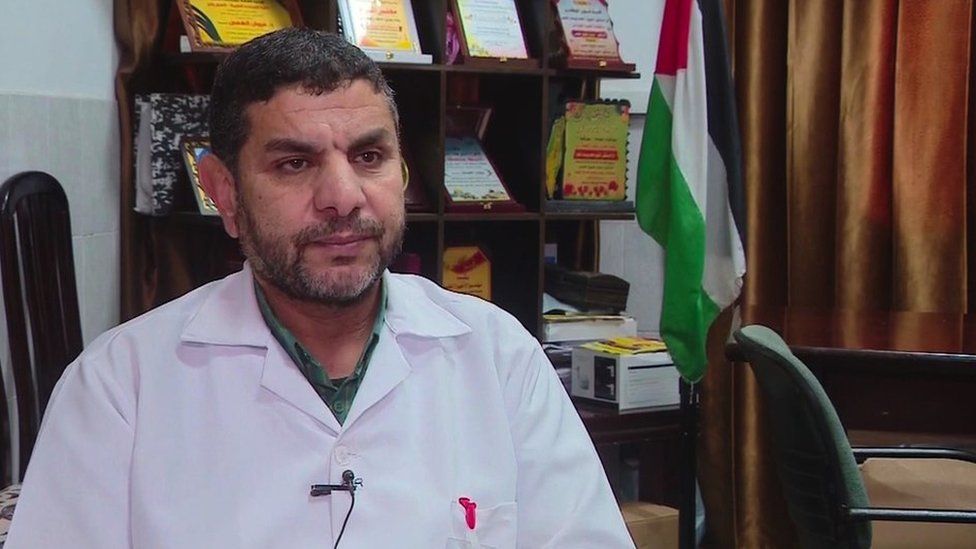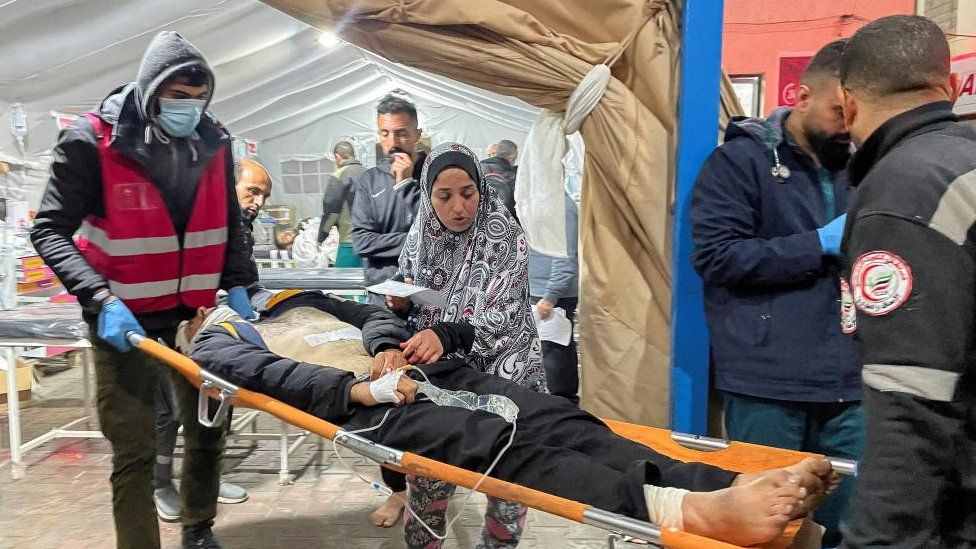
Gaza doctors: ‘We leave patients to scream for hours and hours’
- Published By The Statesman For The Statesman Digital
- 1 year ago
Doctors across Gaza have described operating on patients without anaesthetic, turning people with chronic conditions away, and treating rotting wounds with limited medical supplies.
"Because of the shortage of painkillers we leave patients to scream for hours and hours," one told the BBC.
The World Health Organization (WHO) has described the state of healthcare in Gaza as being "beyond words".
It said 23 hospitals in Gaza were not functioning at all as of Sunday - 12 were partially functioning and one minimally.
The health agency said air strikes and a lack of supplies have "depleted an already under-resourced system".
The Israel Defense Forces (IDF) says Hamas "systematically uses hospitals and medical centres for its terror activities".
In a statement to the BBC, it said the IDF "did not 'attack' hospitals, but rather entered specific areas… [to] neutralise Hamas' infrastructure and equipment, and apprehend Hamas terrorists, while acting with great caution".
It said it was allowing humanitarian aid into Gaza, including medical supplies.
Aid organisations, including the WHO, say there have been "repeated access restrictions and denials".
Warning: This article contains details some readers may find upsetting
Hospitals stretched
Many of Gaza's hospitals are overcrowded and have limited equipment, healthcare workers say. There are reports that some hospitals in southern Gaza are operating at over 300% of their bed capacity.
Four field hospitals have been set up in Gaza, with 305 beds combined, according to the WHO.
On Sunday, it said the Nasser hospital in southern Gaza was the latest facility to become non-operational, following a raid by Israeli forces.
The IDF said on Sunday night it had found weapons at the hospital, as well as medicines with the names and photos of hostages on them, and had apprehended "hundreds of terrorists" hiding there. "Hamas continues to put Gaza's most vulnerable citizens in serious danger by cynically using hospitals for terror," it earlier told the BBC.
Staff at nearby hospitals say the operation at Nasser has put extra strain on them.
Yousef al-Akkad, director of the Gaza European Hospital in the southern city of Khan Younis, described the current situation there as the "worst we've faced since the beginning of the war".
"This situation was severe before, so what do you think it's like after receiving thousands more who've been displaced and are now staying in the hallways and the public areas?"
He said the hospital did not have enough beds for the patients needing treatment, so staff were laying sheets over metal frames and wood, and putting "a lot of patients on the floor with nothing at all".
Other doctors from across the Gaza Strip described similar situations. "Even if there is somebody with cardiac arrest or cardiac problems, we put them on the floor and start to work on them," said Dr Marwan al-Hams, director of Rafah's Martyr Mohammed Yusuf al-Najjar Hospital.
A Hamas political committee appoints directors of public hospitals in Gaza. In some cases, these directors were in place before Hamas took control of the Strip.

Medication and supplies
Doctors say they are struggling to work with limited medical supplies. "We cannot find a drop of oxygen," one told the BBC.
"We're missing anaesthetics, supplies for the ICU, antibiotics and lastly painkillers," said Dr al-Akkad. "There are a lot of people who were severely burnt… we don't have any suitable painkillers for them."
One doctor confirmed that operations were going ahead without anaesthetic.
A WHO team said they recently met a seven-year-old girl at the European Gaza hospital who was suffering from 75% burns, but unable to receive pain relief because of short supplies.
Dr Mohamed Salha, acting director of northern Gaza's Al-Awda hospital, said people had been transported for treatment there on donkeys and horses.
"The catastrophe is when the patients' wounds are rotting, as the wounds have been open for more than two or three weeks," he said.
He said doctors there had performed surgeries by the light of headtorches because of electricity shortages.
Staff separated from families
The WHO says there are around 20,000 healthcare workers in Gaza, but that most are not working "as they are struggling to survive and care for their families".
Dr al-Akkad said the numbers of staff and volunteers at his hospital had grown, partly because of people displaced from other areas coming to help. But he said it was not enough to cope with the volume of patients and types of injuries they were receiving.
Following bombings, he said injured people come to the hospital "looking like kofta" - a dish with ground meat.
"The same person comes with brain injuries, broken ribs, broken limbs, and sometimes losing an eye… every injury you can imagine, you can see it in our hospital."
He said one patient could need five or more specialist doctors to deal with the range of injuries.

Some of the doctors who have continued working are separated from their families.
"My family has been away from me for more than three months and I long to embrace them," said Dr Salha in northern Gaza, whose family have sought safety in the south.
"My consolation is that I am here serving children, women and the elderly in receiving health care and saving their lives."
No room for chronic patients
Doctors told the BBC that people in Gaza with chronic conditions had "paid a big price".
"Frankly we don't have any beds for them or any potential to follow up with them," said Dr al-Akkad.
"For anybody who does dialysis four times a week, now he does it once a week. If this guy was doing 16 hours a week, it will be one hour now."
Some women are giving birth in tents with no medical support, while hospitals that provide midwifery services say they have limited capacity.
"In one department a person dies and in the other department a new life is born. Children are born and there is no milk for them. The hospital provides one box of milk for every child," Dr Salha said.
People are coming to hospitals with diseases that have spread in overcrowded and unsanitary conditions.
"There are sicknesses and we can not find any cure," said 54-year-old Abu Khalil, who has been displaced to Rafah in southern Gaza.
"We need to go out from dawn and get in a queue and maybe you will find 100 people in front of you. You go back empty handed."
Share on
SHARE YOUR COMMENT
MORE STORIES FOR YOU
Trending Stories
DJ Mo’s former illicit lo...
- Published By Jane
- January 15, 2024
Mapenzi! Zari and Tanasha...
- Published By Jane
- October 24, 2023
Zuchu Speaks on Diamond P...
- Published By Jane
- October 12, 2023
Hio Ni Upumbavu Wasituche...
- Published By Jane
- November 8, 2023
RECOMMENDED FOR YOU
How People are Using AI t...
- Published By The
- October 29, 2025
How Raila Odinga’s Death...
- Published By The
- October 29, 2025
What is Ayurveda? Raila O...
- Published By The
- October 29, 2025
Why Parents Should Spend...
- Published By The
- October 29, 2025
Latest Stories
See The Foods That Make Y...
- Published By The
- November 2, 2025
Actress Regina Daniels Bu...
- Published By The
- November 2, 2025
"Don't Give Birth if You'...
- Published By The
- November 2, 2025
Uhuru Kenyatta’s Health A...
- Published By The
- November 2, 2025



